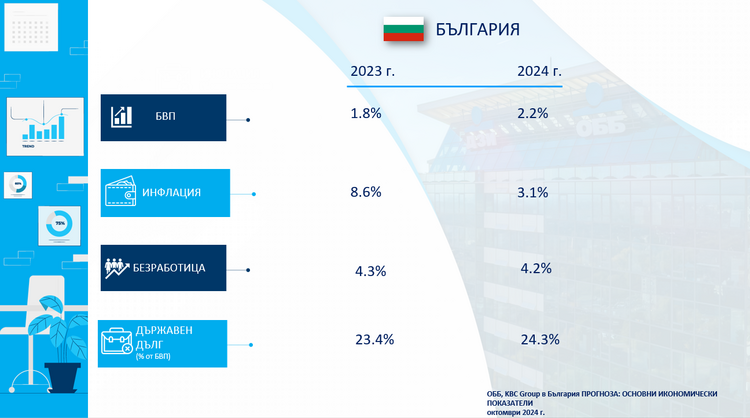Bulgaria is likely to reach the inflation threshold for euro zone membership within the next three to six months, according to an analysis by United Bulgaria Bank (UBB) based on the latest data from the National Statistical Institute (NSI) and Eurostat.
The analysis summarizes that the harmonized inflation rate in August 2024 has fallen again to 2.4% compared to August 2023. Core inflation (excluding food and fuel) was 3%, but inflation as measured by the CPI has since fallen to 2.1%.
Emil Karchev, chief economist at UBB, said the average inflation rate over the past 12 months, one criterion for euro zone membership, had slowed to 3.3% in August 2024. The benchmark is the average inflation rate for the three euro area countries. He explained that the lowest inflation rate of +1.5 percentage points has also fallen to 2.7%, outlining the possibility that it will subside in the next three to six months.
According to NSI data, the bank's analysts report that the real growth rate of the Bulgarian economy in the first half of 2024 was only 2% compared to the same period in 2023.
Growth was primarily driven by services and industry. “Even though the services sector was not the fastest growing niche sector in the first half of 2024 (1.7% year-on-year), it boosted Bulgaria's GDP with a large relative share of 61.7%,” Karchev said. said. The industry reported a 2.2% increase in output, but the impact was weak as its GDP share was a third higher at 18.9%. “Agriculture grew by 0.9%, with a share of GDP of 4.4%, while the smallest industry, construction (2.6% of GDP), increased its output by 1.6%,” Karchev said.
The analysis also shows that although the outlook for the euro area economy has improved slightly, the outlook for the German economy remains relatively pessimistic. UBB has slightly revised down its forecast for Bulgaria's real GDP growth, citing the recession in Germany, Bulgaria's largest trading partner, and the deepening political crisis in Bulgaria. According to the analysis, the harmonized unemployment rate remained stable at 4% from May to July 2024. Against the backdrop of a slowdown in the inflation rate, average monthly wages have once again accelerated their rise, reaching record highs of 19.4% and 18.1% from the previous month in June. The report further states that it will occur in the same month of 2023.

